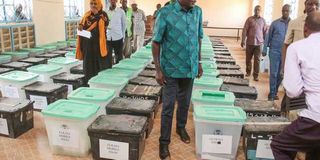Premium
IEBC plan to reuse 2017 poll system triggers calls for disbandment

Orange Democratic Movement and Amani National Congress have called for the disbandment of the Independent Electoral and Boundaries Commission. PHOTO | FILE | NATION MEDIA GROUP
file | Nation
What you need to know:
- ODM secretary-general Edwin Sifuna took issue with the IEBC’s announcement of its intention to reuse the 2017 technology it procured from French firm Idemia, formerly OT-Morpho.
Currently, the commission owns the Idemia hardware, but still needs regular software updates from the French firm – which, if not done, the IEBC says, will mean procuring a completely new system.
A proposal by the electoral agency to reuse 2017 poll tools for the 2022 general election has triggered fresh calls for its disbandment.
Raila Odinga’s Orange Democratic Movement and Musalia Mudavadi’s Amani National Congress yesterday called for the disbandment of the Wafula Chebukati-led Independent Electoral and Boundaries Commission and the recruitment of a new team to oversee the 2022 polls.
“Chebukati and co are remnants of a disgraced IEBC; a commission that badly bungled an election,” ANC secretary-general Barrack Muluka told the Nation.
“In the interest of honour and self-esteem, that team should have gone home a long time ago.”
Mr Muluka said the Building Bridges Initiative (BBI), a product of the Handshake between President Uhuru Kenyatta and Mr Odinga in 2018 “were all factors that came out of what the disgraced IEBC did in 2017”.
SCANDALOUS
“It is shameful and scandalous that these are the same people telling us about 2022. As a matter of urgency, we hope to very soon replace these people and have a breath of fresh air in a body so integral to our democracy,” Mr Muluka said.
ODM secretary-general Edwin Sifuna, on the other hand, took issue with the IEBC’s announcement of its intention to reuse the 2017 technology it procured from French firm Idemia, formerly OT-Morpho.
“Technology in itself is not the problem. The people who opened the backdoor for interference with the technology are the problem,” Mr Sifuna told the Nation yesterday. He cited the recommendation by the BBI team to restructure the commission as an important consolation.
“We are comforted by the knowledge that the current commissioners will never run another election in Kenya. We understand the need to save on costs, but we would insist on certain safeguards,” Mr Sifuna argued.
IEBC commissioner Abdi Guliye told a webinar to assess Kenya’s preparedness for the 2022 polls that the commission was keen on updating the Kenya Integrated Election Management System (Kiems) software for use in the next election.
Currently, the commission owns the Idemia hardware, but still needs regular software updates from the French firm – which, if not done, the IEBC says, will mean procuring a completely new system.
INSTABILITY
Mr Chebukati, who now only remains with commissioners Prof Guliye and Boya Molu, thinks the proposal for their ouster is ill-advised and may lead to instability at a crucial time of preparing for the 2022 polls.
“Going into the 2022 General Election with a new set of commissioners and secretariat staff will not only seriously undermine credibility of the elections but may also result in political instability,” Mr Chebukati told the BBI team in a memorandum.
He explained: “The conduct of elections is not an event but follows a five-year electoral cycle that requires sufficient preparation, overseen by personnel with requisite knowledge and skills.”
In his memorandum, Mr Chebukati proposes that the current recruitment, which comprises a team from religious leaders, civil society and professional bodies, be retained.
The IEBC chief also wants the recruitment of the commissioners staggered so that their terms do not end at the same time.
IEBC has been left with only three commissioners following the resignations of Vice-chairperson Connie Nkatha Maina, as well as commissioners Paul Kurgat, Margaret Mwachanya and Roselyne Akombe.
As it stands, the most feasible way to remove the IEBC team will be a negotiated settlement like the one handed to the Issack Hassan team in 2016, with the option of forming a tribunal to investigate them being the hardest.
The current commissioners have been in office for just about three-and-a-half of their six-year terms, having taken office on January 20, 2017. With contracts running until 2023, removing the three sitting commissioners now would mean the taxpayer would have to pay them for the remaining time in their contract, as well as 31 per cent of annual basic pay for every year served as gratuity.




